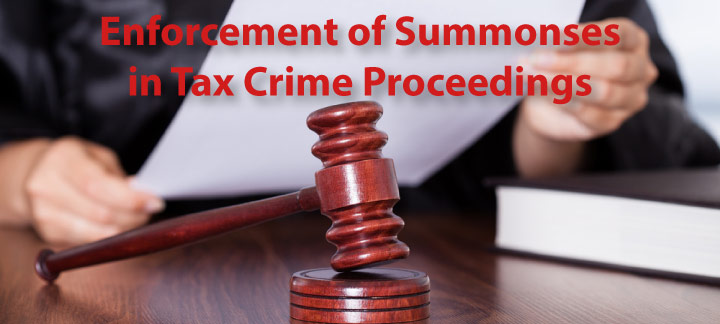Enforcement Proceedings: Summonses in Tax Crime Cases
If a special agent in a tax crime investigation issues a summons which is ignored, the Criminal Investigation Division may institute an enforcement action against the summonsed party. The U.S. District Courts have the sole original jurisdiction to review noncompliance with administrative summonses issued by the IRS. If the summons is not complied with within six days of being issued, the Criminal Investigation Division may begin the process of initiating a judicial proceeding. In order to begin an enforcement action, the IRS must first file a petition to enforce. In some jurisdictions, the district court may also issue an order showing good cause why the summons should not be enforced.
What Happens When a Petition to Enforce a Summons is Filed?
When a petition to enforce is filed, it should also be accompanied by an affidavit signed by the special agent who originally issued the summons. The affidavit must contain four prerequisites:
- the investigation will be conducted pursuant to a legitimate purpose;
- the inquiry is relevant to the purpose;
- the information requested is not already within the possession of the IRS; and
- all administrative steps required by the Code have been followed.
The special agent’s documents may be examined and the special agent may be cross-examined during the enforcement hearing. The taxpayer also has the option of serving pre-hearing discovery upon the special agent, which may including written interrogatories or taking the deposition of the special agent. However, this option is available only if the party objecting the summons has made a substantial showing of the impropriety of the special agent’s actions. The government may also conduct pre-hearing discovery.
Common Issues that Arise in the Use of Summonses in Criminal Investigations
Special agents typically spend a great deal of time and effort drafting summonses. Despite this, they often encounter difficulties enforcing summonses, which can be used to the advantage of a taxpayer in tax crime defense or other third party witnesses who are served with one.
A common challenge to the enforceability of summonses relates to the way the summons describes the documents to be produced. Under IRC § 7603, the documents to be produced pursuant to a summons must be described with “reasonable certainty.” If the summons contains extremely broad language making it difficult to interpret, enforcement may be denied. A judge may also fail to enforce a summons where the broad wording requires the creation of certain documents or testimonial acts in connection with the document production, compels the creation or completion of a document, or contains the phrase “any or all” when describing a list of documents to be produced.
What Happens if the Summonsed Party Cannot Produce Documents or Records?
If the summonsed party is unable to produce documents due to nonexistence of nonpossession of the documents, that party has the burden of proving these defenses falls to the summonsed party. Failing to produce documents or cooperate with the special agent during a summons proceeding can have serious consequences for the summonsed party: failure to abide by a court’s order enforcing the summons is deemed as contempt and may be punishable by a fine or imprisonment. In order to prove contempt by the summonsed party, the government must show contempt by clear and convincing evidence (1). Courts have generally required summonsed parties to take “all reasonable efforts” to comply with the summons, particularly where the documents or records being requested are not in the summonsed party’s possession, but are in the possession of another party under the control of the summonsed party. In those cases, the summonsed party’s burden of proving inability to produce documents becomes significantly more difficult if the IRS is able to establish that the party had prior or recent control over the requested documents and records. Although present inability to produce documents or records may be a valid defense to a summons, a self-created inability to do so will not suffice.
Can a Summonsed Party Object Enforcement of the Summons?
In some cases, the summonsed party will object to the enforcement methods used by the IRS, while accepting the enforceability of the summons itself. When that occurs, the summonsed party may specifically request judicial oversight over the enforcement process to ensure fair treatment. A court can either grant or refuse enforcement of a summons, or can reform it, impose limits on compliance, or provide other conditions similar to what would be available under a civil protective order. Summonses are rarely quashed on technical grounds, but they may be quashed if the special agent waives appearance or does not insist on a formal refusal by the summonsed party. Occasionally, a summonsed party will attempt to quash enforcement of the summons by arguing that state law confidentiality or immunity laws provide protection. However, the IRS is usually able to obtain access to these documents even with the state law confidentiality and immunity. Federal courts have a pattern of enforcing IRS summonses when conflicting with state statutes or agency rules under the rationale of the Supremacy Clause of the U.S. Constitution. In some cases, courts will modify or limit the summons so as to prevent the disclosure of protected information while still facilitating enforcement with respect to other documents and records sought by the IRS.
How a Tax Attorney Can Help with Summonses in Criminal Investigations
If you are under investigation by the IRS for a potential criminal prosecution, then you must consult with an experienced tax attorney. San Diego Tax Lawyer William D. Hartsock has been successfully helping clients with criminal tax issues since the early 1980s. Mr. Hartsock offers free consultations with the full benefit and protections of attorney client privilege to help people clearly understand their situation and options based on the circumstances of their case. To schedule your free consultation simply fill out the contact form found on this page, or call (858) 481-4844.
- United States v. Berg, 20 F3d 304 (7th Cir. 1994).



Comments (0)